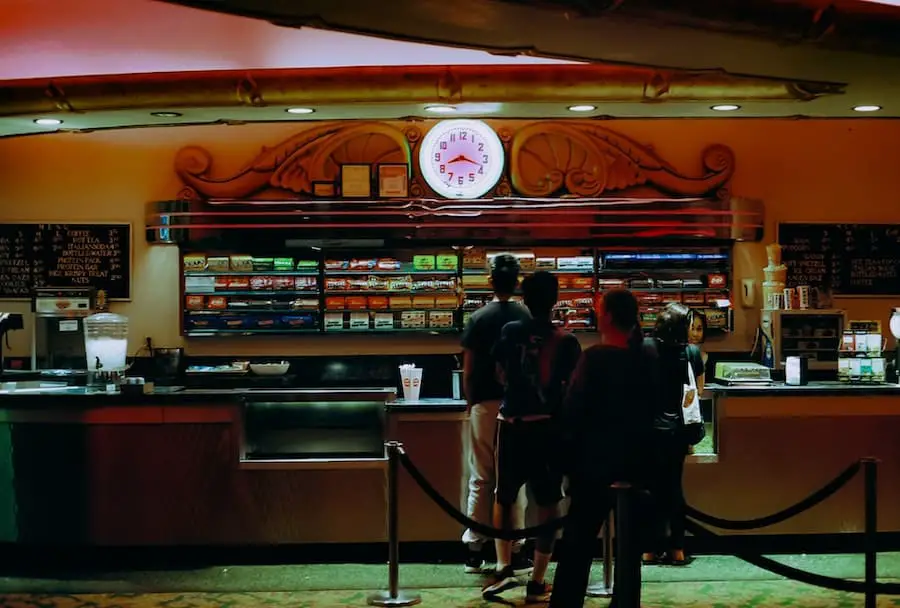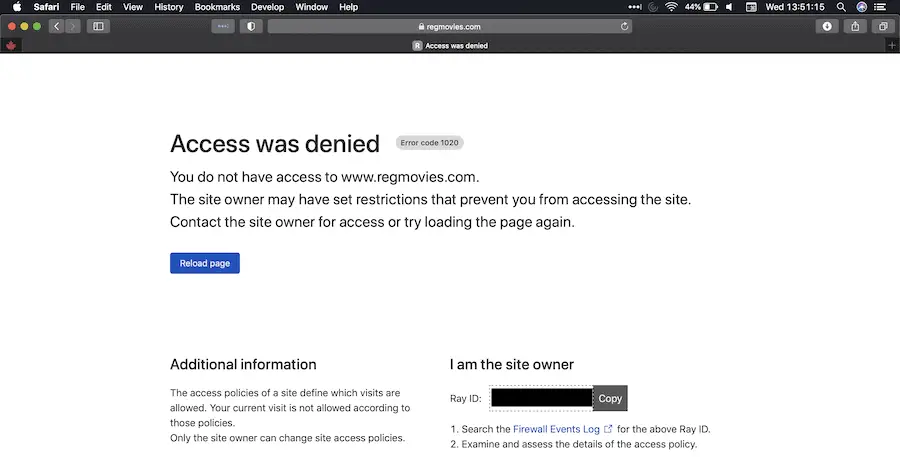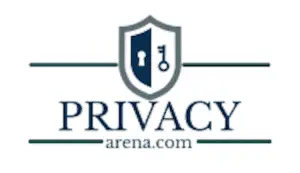Nowadays, it seems that everywhere you go, if you look around, or maybe I should say if you look up, there’s a big chance you may spot a security camera looking right back at you. Whether it’s at the mall, at the bank, in your local hardware store or even at your kid’s high school. But what about the movies? Have you ever wondered if there are cameras in movie theaters?
Most movie theaters do have security cameras installed at cash registers, concession stands, and monitoring entrances and exits and high traffic areas. There is also some evidence that may suggest that at least some movie theaters have cameras in auditoriums, however websites of major US and Canadian movie theaters do not mention the use of cameras in auditoriums.
So, what are the benefits of security cameras? and why are there concerns surrounding their use in movie theatres? What’s the evidence that there are security cameras in some theater auditoriums? I will cover all that and more in this article.
Movie Theater Camera – Are There Any Benefits?
The use of surveillance cameras in movie theaters have many benefits, whether installed inside viewing rooms or outside. Here are some of the benefits:
- Monitor for Security and Access
Public gathering places like stadiums and convention centers often have security screening for public protection. Movie theaters, on the other hand, are known for a more relaxed atmosphere and crowds of moviegoers are allowed access with no routine security screening.
That’s where security cameras present their primary benefit.
Security cameras are commonly installed at entrances and exits of movie theaters. They are also installed in hallways and at all access points.
These cameras allow continuous monitoring of visitors and employees for any disruptive or criminal behaviour and provide means of ensuring employee compliance with policies related safety, violence, and harassment at the workplace. In addition, surveillance systems help prevent any unauthorized access to restricted areas.
- Help with Loss Prevention and Investigations
Movie theaters’ revenue comes primarily from ticket sales and concessions stand sales, with the latter contributing a major part of the profits. With many point-of-sale locations at every movie theater, each locations provides an opportunity for theft and revenue loss.
Security cameras installed at these points allow monitoring of staff and visitor behaviour during transactions to reduce revenue loss by deterring theft or fraudulent activity. And in the event of an investigation into an incident, security cameras provide footage that can be used to identify the time, location and individuals involved.
- Reduce Insurance and Liability Expenses
Installation of security cameras as a part of a security system for a business, may qualify the business for an insurance premium discount. Furthermore, movie theaters that have surveillance cameras are prone to file fewer insurance claims and can fight false liability claims saving them and their insurance a lot of money.
- Provides Feedback for Business Operation
Movie theater leadership that are focused on efficiency and growth aspect of the business can use data extracted from surveillance footage at point-of-sale locations to inform decisions about day-to-day operation and workforce planning.

By monitoring traffic at different sales locations, such as concession stands and gift shops, during different times of the day, and evaluation for long term trends and patterns in visitor numbers and purchase interests, managers can plan employee scheduling and assignments more effectively.
The following potential benefits apply to cameras inside movie theater auditoriums:
- Fight Piracy
Illegal piracy is a world-wide problem that has major impacts on the movie industry.
According to DataProt, a 2017 study showed that the annual losses attributed to digital piracy in the movie industry is between $40 and $97.1 billion. Another study in 2016 suggested that if piracy is eliminated from theaters, this could result in an increase of 15% (or $1.3 billion) annually in box-office revenue.
Illegal recording of new releases in movie theatres is one of the ways digital copies of movies are acquired for release on pirated content websites. The use of security cameras in movie theater auditoriums can help in fighting piracy. Cameras with infrared sensing can monitor the audience can be for any recording devices.
- Prevent illegal sexual activity
For those (younger) couples who go to the movies with a plan to make out, think again! You may be watched, and even more, everything you do may be recorded!
Surveillance cameras in auditoriums at movie theaters can also help monitor for any illegal sexual activity inside the theater.
And you can get into trouble…like serious trouble!
If caught making out in a movie theatre, at the very least, you will be asked to leave and will be embarrassed as you’re escorted out of the building. But on a worst case scenario, if the police is involved, you may be charged with a misdemeanor, which in most cases can carry a sentence of up to one year in jail and a fine according to Criminal Defence Lawyer.
- Encourage Purchases at Concession Stands
Do you know why movie theaters almost always have a “no outside food” policy?
Well, it’s not because they don’t want you to drop food on their theater seats. It’s mainly because the bigger part of their profits comes from snack sales at the concessions stands.
While some people are occasionally able to sneak in some homemade popcorn or a bag of chips and get away with eating it during the show, cameras in movie theatres can help deter that behaviour. In doing so, purchases at concession stands will be encouraged which in turn will help boost movie theater revenues.
So Is There Evidence That There Are Cameras in Movie Theatres?
A few sources on the internet have addressed the question of whether or not there are cameras in movie theatres. All these websites are confirming that movie theatres do use cameras in their auditoriums to fight illegal piracy, sexual activity and to control entry of outside food and drink.
Some of these websites claim that cameras are installed behind the viewers, in or near the screening room, so that they are well hidden out of sight. I would argue that installing “hidden” cameras in a place of work or business would be in violation of privacy laws and recording laws (at least in some states and jurisdictions).
Others also bring up a valid point that theatres may be prohibited by the movie industry from installing cameras facing the screen. This would make sense because in that location, those cameras would record the movie being screened and the footage may be leaked or stolen and become the source for pirated material.
A more plausible suggestion is that cameras are installed at the front of the auditoriums, either above the screen, or as some have suggested, behind the screen.
The consensus is that cameras used in thaters are Pan-Tilt-Zoom cameras that use infrared sensing to allow them to record in a dark setting.
What About the Evidence?
None of the websites claiming that there are in fact security cameras inside the auditoriums of movie theaters have presented any evidence to support their conviction. So, let’s review the evidence, or the lack of it.
Review of Privacy Policies:
The three largest movie theater chains in the US are AMC Entertainment, Regal Entertainment and Cinemark Theaters. When I reviewed their privacy policies published on their websites, here’s what I found.
AMC’s and Cinemark’s privacy policies have no mention of the use of surveillance cameras in their theaters to fight media piracy. There is also no mention of the use of hidden cameras or any other method of monitoring inside viewing rooms.
Regal entertainment’s privacy policy apparently does seem to mention the use of CCTV in their cinemas “for security and crime prevention” based on the google search result information.

There seems to be more information in their privacy policy, however, when I tried to access the full policy, I was denied access to their website, despite using different browsers and different computers, as shown in the screen shot below.

I also looked at Cineplex, the largest cinema chain in Canada. Their privacy policy does mention the use of video surveillance at their physical locations to ensure the safety of their properties, and for crime deterrence and detection. The policy also mentions the use of cameras to “better understand traffic patterns and aggregate demographics about guests.”
In all the four movie theater websites reviewed, there was no mention of the use of visible or hidden security cameras inside the auditoriums for any purpose.
Existing Evidence
After scouring the corners of the internet for a few hours, I was only able to find two pieces of evidence that support the possibility that there are cameras inside auditoriums in at least some movie theaters.
This video was part of a news report aired by CNN in 2014 showing footage from a camera inside a movie theater in Florida where an unfortunate fatal shooting took place.
Despite the poor quality of the footage, it is clear evidence that that particular movie theater did have security cameras installed on, what appears from the direction of the footage, the side wall, or back corner of the auditorium.
The second piece of evidence is a more recent TikTok video posted in November 2021 by what appears to have been a former employee of a Vue movie theater. The video shows a screen displaying multiple views from at least nine security cameras showing different screening rooms in the theater.
The angle of the image displayed in the monitor suggests the cameras are installed at the front of the screening room facing the audience.
Reviewing the privacy policy for Vue Theaters published on their website, the policy indicates that they do use CCTV systems for the prevention and detection of crime, for safety and security and to support the management of business operations. The policy also states that under normal circumstances, footage from security cameras is retained for up to 30 days but may be kept longer if required for an ongoing investigation.
Should You Be Worried About Security Cameras in Movie Theaters?
The short answer is No!
Security cameras in movie theaters are there to improve the safety and protection of the business, the employees and the moviegoers alike. They are not intended to spy on you per se. And if you do not want to be seen or recorded doing something wrong or illegal, then just don’t do it!
Movie theaters are public places and therefore visitors do not have an expectation of privacy as they would have in their homes for instance. As such, the same privacy and recording laws apply in movie theaters as they do in any other public place.
Final Thoughts
Like many other businesses, movie theaters use surveillance cameras as part of their security and safety measures. Security cameras in movie theaters provide a lot of benefits in other areas, including optimizing management and decision making, improving loss prevention, and boosting revenue.
We have presented some evidence supporting the possibility that movie theaters may have security cameras in their screening rooms to help combat media piracy, illegal sexual activity in a public place and control entry of outside food and drink.
Next time you’re at the movies, look around and see if you could spot the cameras. I know I will be doing same!


